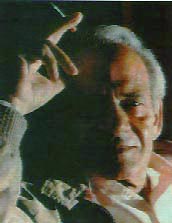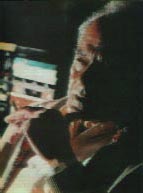
Search the Republic of Rumi |
|
DAWN Tuesday Review,April 16-22, 1996 PROFILE: A. HAMEED "A Dream Merchant 
 It is so difficult to write about A. Hameed. It is just as easy to hail him as the greatest romantic in Urdu literature as it would be appropriate to put him down as a pathetic hack-writer. He has written the best of fiction and he has written the worst of it. Any attempt to seek an explanation from him would be an exercise in futility because the man is ambivalent -- much too ambivalent to give a very solid non-fiction statement on any issue. On the one hand he would say he is satisfied with the quality of his work . Yet, in another mood he will frankly admit that his Nadeem Ka Safarnama was a total flop and he had to abandon it hopelessly after its first twenty-three books had been published. How do you explain such a phenomenon as A. Hameed? Magical realism, of course. No, I don’t mean to say he writes magical realism. He is magical realism. In the middle of our conversation he informs me that while he was speaking to me about his day-to-day life he has also completed a ‘mindwalk’ to Egypt 5000 B.C. and returned. I might not have believed him. But having read his books I know him to be a contemporary of Akhenaton, so that’s alright. Hameed closes his eyes for a second and re-opens them. The world has changed. It is the pre-WWII Lahore. When everything is in black and white -- in the movies, that is. Hameed is a young student, barely in his teens. And he is in love with those shadows on the wall. Young Hameed lives in Amritsar. But does he? Almost daily after his college he takes a train to Lahore to watch Frankenstien in a local cinema. Now, this is the cinema. The ghastly face of Boris Karloff appears in a frightening close-up. Hameed looks at the living corpse and has a wonderful experience. He dies. When he is born again, he too has been through the world of the dead, like that Frankenstein out there. And he knows all the secrets of the dead. Another time, another play. This is K.L. Saigal. Karavan-e-Hayat. Now, this is My Sister. "Do nainan matvaray... Hum per situm karein..." Hameed find do nainan matvaray also doing situms on him. They belong to a girl from Lahore. Falling in love. Then falling out of it, and then back again. Nothing really matters to Hameed - except the impressions on his mind. Virtul reality. The impressions of his love are strong enough to tease a short story out of him which claimed for him praise from all the romantics, escapists, narcissists, progressives, laymen and critics. They are saying Hameed writes with a branch of rose and the words smell just as sweet. Another fiction. To add style to his talent, he opens his English primer and puts the first letter of the alphabet before his name - just for the heck of it ! A. Hameed writes Jungle Rotay Hain. Nobody knows how to praise it. It is the magic. Simple magic. The story of a naïve girl of the mountains... Ravished by a heartless knave of the cities. She comes to the city... caught in the web of forced prostitution... can’t go back. Only A. Hameed can write this story the way it is written in this novel. You read, you dream, you sing, you dance, you cry, you faint. "It was based on something I saw in real life," he confides to me. Then he adds, "All my stories are based on real life incidents." I have no reason to believe this. Actually I don’t trust this man to be able to distinguish between dream and reality at all. "I don’t give a damn about what history teaches us, or whatever. I just fall in love with that which is no more. When something disappears, and you can see it no longer. There is romance. I see a girl painted by Renoir. I say to myself: two hundred years ago this girl used to live in Paris. She was in the garden when he painted her. She is no more. She is gone. How beautiful she was. And there was a kid with her. And there a man is strolling in the same garden. He does not know he has become immortal. At least in pictures." The thing which totally threw him off was the story of The Wandering Jew. A friend gave him a few chapters from the story of the Jew who taunted Jesus on his last walk, saying, "Go, go, fast." And Christ looked back and pronounced the curse, "Alright, I go fast. But you will live until I come again." And the Jew lived through centuries. Nothing could kill him. Not fire. Not weapon. Not all the gunpowder in the world. A.Hameed does not tell me, but I can imagine him not being able to sleep for several nights afterwards wondering about the wandering Jew. What if? And then came The Egyptian (1954). The enchanting story about Akhenaton’s Egypt. A. Hameed finally knew what was missing in his life. He had been born in the wrong age. Actually he belonged to ancient Egypt. How shall he make it all the way back to where he ought to be? A.Hameed realized that only children can believe what he was going to tell the world. So he turned to them. Once again he was young. Once again he was in the cinema. Dead. Then alive. He wrote a story for children in three volumes. Lash Zindah Hoe Gai. The name says is all. We don’t need to ask him where did the inspiration come from. But what needs to be acknowledged is that this is not only the most successful attempt a writing horror fiction for children in Urdu but also stands out as one of the greatest masterpieces of junior fiction in Urdu. A.Hameed did not write children’s books because publishers Sheikh Ghulam Ali & Sons wanted to print them. He wrote them because he had to. There was a child in him who had refused to grow up. Who still believed that dragons and giants exist, and that magic and occult explain all the acts of nature. "These people don’t write stories for children," he shows his anger for his contemporary writers. "The children within them have all died. When they write, they write artificial things. They say, make it easy. And they end up writing unreadable stuff. Only he who is a child in his heart knows how to write for children. Never compromise on fantasy." The scores for tiny books he has written for children are stuff that any literature of the world would be proud of. It is a pity nobody has so far thought of collecting these tales in anthologies. His most controversial outputs are his "novels" for children. Chief among them, Maut ka Taaqub, a story which spreads over 300 episodes (more than 35,000 pages in paperback!) A.Hameed starting writing it in the early ’70s and he is still writing the three-hundred-and-somethingth’ part -- it might well be the longest children’s story of the world -- will somebody please stand up and inform The Guiness Book of World Records? Personally I think Maut Ka Taaqub contains some extremely well-written passages and needs to be kept alive as a gift for all children. How did it all start? "They wanted me to write something really longish. Something to go up to fifty episodes or so. I remembered my fascination with the wandering Jew. So I created a character that is cursed by a spirit from the pyramids that he may live forever. He does not die, lives on through centuries and so in his company, we also meet Akhenaton, heroes of Troy, Alexander, Ceasar, Hannibal, Genghis Khan, Nebuchadnezzar, Hamurabi… of course I modeled my protagonist after the hero of The Egyptian. And he, too, is born in the days of Akhenaton. I call him Amber." On his way to forever, he meets Naag, a serpent who changes his form to become human or animal whenever he likes; and Marya, an invisible woman. "Together they start on a spectacular journey which takes them not only through history but also through geography -- Egypt, Sahara, Babylon, Ninevah, Gobi... but the part I like best is where A. Hameed describes their journeys into Tibet and Himalayas, and the life-giving powers of the lake Nandenser. "I had all these sets ready in my mind. I just had to take my characters to visit each of these historic sxets, and they story would just create itself!" The same immensely uncontrollable power of A. Hameed which has enabled him to create this nearly impossible-to-write saga is also responsible for nearly ruining it. For A. Hameed can never keep things in the real world order. In his saga, Genghis Khan and Hannibal appeared long before Alexander the Great, and all of them together supersede the Trojan Wars -- mistakes no historian will ever forgive. A. Hameed says, "I have at least been successful in giving an idea of the broad periods of history. There was the Egyptian civilization, then came the Babylonians, then the Greeks, then the Romans and so on. Magar mein kiya karoon bhai, jazbati aadmi hoon... (but what can I do, I am an emotional person!)" he adds helplessly. His passions and "virtual reality" overcome him so grossly that he shows the Trojans attacking Sparta and capturing it with the trick of the "Trojan horse" (actually it was in the other round). But all these blunders put in one scale, and the sheer magic of Maut Ka Taaqub in the other, and the balance is sure to tilt with the weight of the magical powers of A. Hameed’s writing. In fact I know at least two young scholars of history who first came across the great heroes mentioned above when they read this series as small children. As they grew up, they corrected all the mistakes on their own, and now I am just amazed at their dexterity. I doubt if they could have pursued historical research with the same degree of vigour if A. Hameed had not manipulated their imagination at an early age. What is he writing these days? Some stuff which I do not dislike in particular but which is certainly nothing comparable to his former achievements. But this is not so much a comment of A. Hameed as it is a judgment to be passed on our society. We have a celebrity like A. Hameed, who is ranked amongst the top thirteen of Urdu short story writers. One of the last ones of the flock of Krishan Chandar, Ibne Insha, Qudratullah Shahab -- and yet we can’t provide conditions where he may choose to write for perfection only. "I am in control of my movement to and from the world of fantasy. But I too get disturbed sometimes by the noises outside, and the tough and ugly realities of hard life. I think if I did not have to worry about these things I might have served the cause of literature better... laikin qudrat koh joh manzoor hoh! God has kept me just where I belonged. Who knows, if I were born in a rich family I might not have had written all these things. So, then I think God has created destiny and there is meaning to it. |
A.Hameed realized that only children can believe what he was going to tell the world. So he turned to them. Once again he was young. Once again he was in the cinema. Dead. Then alive.
|
||